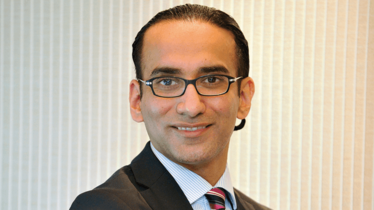Emerging Market Explorer
Sitting Down With... Raman Singh, President, Mundipharma Asia Pacific, Latin America, Middle East and Africa.

How did your career get started?
Actually, with a bit of luck! When I first started out in healthcare, I didn’t realize I would be in the industry for so long. I haven’t done a PhD or a lot of research, and my undergraduate was in engineering and business. After graduating, I got an internship at Bayer and I saw firsthand the impact that healthcare and life sciences have on people and communities. It’s a fantastic industry to work in. When I first set out, the pharma industry was just getting started in countries like Vietnam and Cambodia – but no one actually wanted to go over there. I have a bit of a maverick streak, so I took the opportunity to work on an assignment for three months to set up operations in another country. The rest is history. I left my internship and joined Bayer full time. Later on, I moved to GlaxoSmithKline, but I’ve been with Mundipharma since 2011.
What is it that drew you to emerging markets?
Two thirds of the world’s population live in emerging markets and access to care is not as it should be. I’m inspired by the enormous, positive impact that we could have on this space. And when you’re working in these markets, you see those changes and transformations with your own eyes.
I’ve had the opportunity to work in Thailand, Singapore, South Korea, Australia, the US and the UK. Every market, whether emerging or developed, has its own nuances in terms of culture, people, healthcare systems, politics, and so on. Every time I step into a new country everything changes. And it excites me because it gives me an opportunity to understand and learn about that marketplace. I’ve learnt to adapt to new environments quickly and to make myself as globally relatable as possible.
Which market was the most interesting?
South Korea – it was very interesting and very fulfilling. It was also the first time I went into a new market as a general manager. The culture was very different and they did not speak a word of English – and I did not speak a word of Korean; I had to rely on interpreters and translators. It was a very interesting dynamic. I also had to very quickly come to terms with the fact that I was the captain of the ship and it was much more challenging than just focusing on one area of the business. I needed to adapt depending on different situations and functions.
How did you come to work for Mundipharma?
I was very happy at GSK in London and I had a career path ahead of me. I wasn’t actively looking for anything else when Mundipharma came along. They offered me the sure possibility of making a difference in the world and it was too tempting to refuse. They were quite small at that time (revenues of about $60 million in 2011) and they were purely a US, Canada and Western Europe focused company. But they wanted to diversify and be a truly global player – they wanted to bring together Latin America, the Middle East, Africa and Asia. It’s been a fascinating opportunity to change the way a company is looked at as a business. When I started in 2011, the emerging markets contributed to less than one percent in terms of global turnover. Now, we’re close to 14 percent – and we’re aiming for around 30 by 2017. We’re aiming for total revenues of around half a billion this year.
Any tips for achieving such high growth?
We have diversified our portfolio and learned to ensure that each product caters to the particular market it is launched in and that it reaches the maximum number of patients possible. Most companies develop a product with a ‘one-size-fits-all’ mentality with no adaptation to individual markets.
What differentiates a good company from a great company are the individuals. The emerging markets are not for everyone. The dynamics and cultures are unique so you need to hire people who can cope. We are very demanding of our employees, but we also reward them well. And they have the opportunity to make some fantastic contributions to communities through philanthropy and charity. For example, during the Ebola outbreak in Africa, we donated one of our medicines, and we also did a lot of work during the Mers virus outbreak in Korea and the Middle East, especially in terms of hygiene education.
Any regrets?
I wouldn’t trade the last four years for anything! When I joined Mundipharma, I had many questions and even my future was a big question mark because the company was unknown. I’d always worked in big companies with big structures where the do’s and don’ts are clearly laid out. But working for Mundipharma has been extremely fulfilling. We’ve grown from a 450-people organization to a 4000-people organization. I feel we’ve had a huge impact on people both internally and externally, and that brings me great satisfaction. But there is still much more to achieve! My goal is to empower everyone in the organization to work together so that the company and its successes are sustainable. In essence, I want it to become a living, breathing entity that is not dependent upon just one person or one team.



















